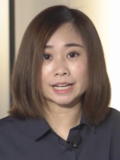Disqualifications
On 30 July, one day before the nomination period ended, 12 opposition candidates were disqualified from the election. Of these, four were incumbent Legislative Council members: Alvin Yeung, Kwok Ka-ki, Dennis Kwok and Kenneth Leung. Activists Joshua Wong and Ventus Lau, incumbent District Councillors Cheng Tat-hung, Fergus Leung, Tiffany Yuen and Lester Shum; former reporter Gwyneth Ho and Civic Passion's Cheng Kam-mun were also banned from running. [1]
In her ruling letter to Gwyneth Ho, returning officer Amy Yeung said, referring to a statement against the national security law from 25 July that Ho had co-signed: "By adopting such an unequivocal expression against the national security law, it casts serious doubt on whether the candidate embraces, promotes, and supports the fundamental principle of 'One Country, Two Systems', and therefore objectively has the genuine and true intention to uphold the Basic Law at the time of the nomination." [11] In her statement, Yeung also referred to the statements of Ho regarding her intent to safeguard national security as "obvious sham". [12] Joshua Wong's disqualification was based on previous statements on "self-determination" made by his disbanded party Demosistō, according to returning officer Alice Choi, as well as Wong's seeking 'foreign interference' in the affairs of the Hong Kong and central government, objection to the national security law and abusing the proper function of lawmakers by forcing the government to accede to certain demands after securing a majority as Choi's ruling stated. [11]
| Constituency | Candidate | Affiliation | Advocated for, or promoted Hong Kong independence or the option for self-determination | Solicited intervention by foreign governments in Hong Kong's affairs | Expressed "an objection in principle" to the imposition of the national security law | Expressed "an intention to exercise the functions of a LegCo member by indiscriminately voting down" any legislative proposals | Refused to recognise the PRC's exercise of sovereignty over the Hong Kong SAR | |
|---|---|---|---|---|---|---|---|---|
| Hong Kong Island | Cheng Kam-mun | Civic Passion | Yes | |||||
| Cheng Tat-hung | Civic | Yes | Yes | |||||
| Fergus Leung | Independent | Yes | Yes | Yes | Yes | |||
| Tiffany Yuen | Ind. democrat | Yes | Yes | |||||
| Kowloon East | Joshua Wong | Ind. democrat | Yes | Yes | Yes | Yes | ||
| New Territories West | Kwok Ka-ki | Civic | Yes | Yes | ||||
| New Territories East | Gwyneth Ho | Ind. democrat | Yes | |||||
| Ventus Lau | Localist camp | Yes | Yes | Yes | Yes | |||
| Alvin Yeung | Civic | Yes | Yes | |||||
| Legal | Dennis Kwok | Civic | Yes | Yes | ||||
| Accountancy | Kenneth Leung | Professionals Guild | Yes | |||||
| District Council (Second) | Lester Shum | Nonpartisan | Yes | Yes | ||||
Potential disqualifications
At least 21 other opposition candidates were still under review by the returning officers, including six Democratic Party legislators and Joshua Wong's nine allies from the "resistance bloc". "Returning officers are still reviewing the validity of other nominations according to the law. We do not rule out the possibility that more nominations would be invalidated," the government said in a statement. [14] It was reported that Ted Hui, Eddie Chu, Raymond Chan, Jimmy Sham and Sunny Cheung were also going to be disqualified. [15] However, the entire electoral process was suspended after Chief Executive Carrie Lam on 31 July announced that the election would be postponed for a year, citing the resurgence of the COVID-19 cases, leaving the validity of those candidacies unresolved. [16]












